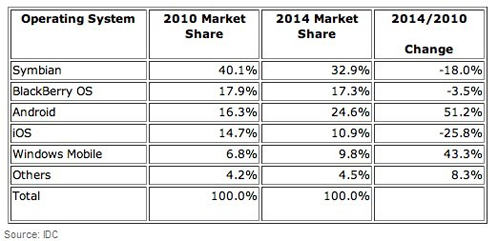CNN消息:Android智能手机市场份额2014年将达25%
从IDC的图表中,我们可以看出,Symbian平台在2010年市场份额将达40.1%,2014年则将降至32.9%;
黑莓2010年市场比重预计17.9%,2014年17.3%;
Android今年市场份额仅16.3%,但乐观估计2014年将达24.6%;
苹果iOS今年将达14.7%,到2014年则可能降至10.9%;
Windows Mobile今年市场份额并不十分可观,仅达6.8%,但2014年有望反弹至9.8%;
其他手机平台市场份额今年总体占4.2%,2014年略有回升,将达4.5%。
而Gartner市场调研公司的数据则与IDC略有不同,但同样对Android寄予厚望,预测2014年Android市场份额将与symbian平起平坐。
从Gartner数据表中可以看出,Symbian从2009年到2014年的市场份额将逐渐走低,从2009年的46.9%,到2010年40.1%,2011年34.2%,再到2014年30.2%;
而Android的市场份额则将一路上扬,从2009年默默无闻的3.9%,到2010年17.7%,2011年22.2%,再到2014年与Symbian势均力敌的29.6%;
Research in Motion与Symbian的情况相似,都呈下滑趋势,2009年的市场比重为19.9%,2010年17.5%,2011年15.0%,2014年11.7%;
iOS的情况则起伏不定,2009年为14.4%,2010年15.4%,2011年17.1%,2014年又回落至14.9%;
Windows Phone去年比重为8.7%,2010年4.7%,2011年5.2%,2014年3.9%;
其他手机平台占6.1%的市场,2010年4.7%,2011年6.3%,2014年将升至9.6%。
观察家认为Android有望赶超Symbian主有两个原因:
首先,Symbian大多数情况下根本不能算是智能手机操作平台,Symbian和黑莓尽管市场成绩不俗,但从NetApplications和Quantcast的调查情况来看,这两者的智能手机浏览器市场份额根本不值一提。这就意味着用户很少使用它们操作系统的“智能”功能,同时也表明用户如果真想使用基于WebKit网页浏览功能的智能手机,他们很可能转向其他操作平台,Android就是个不错的选择。
其次,Android的飞速成长也确实不是侥幸所得,没有理由否定Android市场份额在下一个产品周期(2012年为止)会实现双倍增长的可能。我认为Android在2012年很可能超过Symbian。Android目前已进军中国这个全球最大的手机市场,发展潜力无限,最近将与三星的Glaxy S系列在当地同台竞争。另外,Android在美国市场的增长势头仍然动力十足,该平台每月在当地都有新款的高端产品上市。目前不仅仅是三星落于Android下风,包括摩托罗拉、HTC、LG在内的重量级选手都已被远远甩在身后。
另外,我虽无法判断黑莓Torch和诺基亚哪个行情更次,但认为这两者的产品线都乏善可陈,就算是Windows Phone 7都比它们更有前途。
至于iPhone,我认为它的市场还会继续增长,但是苹果一向吹毛求疵的个性以及高高在上的价格,将导致iPhone很难在市场竞争中占优。
那么Android的发展短板究竟何在?这可能就是制造商和运营商对Android系统的擅自修改,比如说威瑞森(Verizon)公司将必应(Bing)植入三星Fascinate平台中,且不允许用户在该手机上使用Google搜索器。我希望这种情况可以得到改观,也相信T-Mobile本月即将登台的更新版本“Stock Android”G2有望颠覆这一局面。
The pros weigh in: 25% of all smartphones will be Android by 2014
Both think Android will rise, but both are underestimating.
IDC came out with a report earlier this week saying that Android would be exploding, taking a great deal of market share away from other smartphone platforms. By 2014, they think Android will be on a quarter of all smartphones, behind only Symbian.
Gartner this morning took it one step further. Their forecasts have Android neck and neck with Symbian in 2014.
I think they are both too conservative on Android. Here’s why:
First of all, Symbian is, in a lot of cases, barely a smartphone OS. Both Symbian and Blackberry have big market share but barely show up on smartphone browser market share reports from both NetApplications and Quantcast. That means people aren’t using the “Smart” part of their OS. That also means if they want to step up to a real WebKit Web browsing Smartphone, they are likely to switch to another platform. Android is one of those options.
Second, even if you leave in the Symbian “feature phones” in the numbers, Android’s recent growth isn’t a fluke, and there is no reason to expect that in another product cycle (end 2012) we won’t another doubling of its marketshare. I think Android will pass Symbian by the end of 2012.
Android is just starting to go global. Although it is everywhere in the US, it was only in 45 markets earlier this year. Nokia/Symbian is in every market that Smartphones exist in (you could argue that they aren’t actually in the US).
Popular Android ‘superphones’ are just entering China, the world’s biggest mobile market, with Samsung’s Galaxy S line making a big splash this week.
Growth in the US hasn’t stopped, either. Every month, more high end Android phones get launched in the US. Not only has Samsung put its weight behind Android, other major players like Motorola have gone completely Android. HTC and LG can’t stop talking about Android either.
And the first Android phone isn’t yet two years old. The T-Mobile G1 was released in October 2008. There are still people in the US with two year plans that have never had a buying cycle while
Android existed. Even more amazing, the original Droid, the first real Android smartphone, isn’t even a year old. That means there are people on two year plans older than the Droid who won’t get to make another smartphone purchase for another year.
The competition: BlackBerry’s Torch is lackluster. Nokia just hired a Microsoft VP to be its CEO.
I can’t decide which is worse. Neither player has anything impressive in their pipeline. Even Windows Phone 7, which has sold a total of 0 devices, seems more promising than Blackberry and Nokia at this point.
iPhone?
I think the iPhone will continue to grow but high cost and Apple’s (AAPL) pickiness will keep it from becoming a dominant player.
So what’s stopping Android? Manufacturers and Carriers are getting carried away with what they’ve been doing to poor Android. The latest example is Verizon putting Bing on the Samsung Fascinate and not letting you use Google as the search engine on the phone.
Hopefully user backlash puts an end to that. I’m already seeing signs of that with T-Mobile’s refreshing “Stock Android” G2 coming out later this month. hopefully that is a sign of things to come.(source:CNN)
声明:本文中文为游戏邦翻译,英文原文采用CNN,转载请保留版权信息,谢谢!










































 闽公网安备35020302001549号
闽公网安备35020302001549号